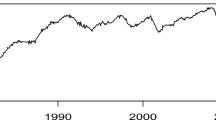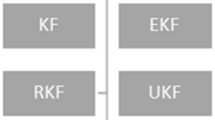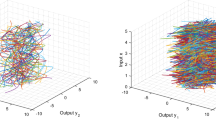Abstract
In this study, a novel adaptive strategy is designed based on fractional least mean square (LMS) algorithm for parameter estimation of Hammerstein nonlinear autoregressive moving average system with exogenous noise (HN-ARMAX). The design scheme consists of parameterization of HN-ARMAX systems to obtain linear-in-parameter models and to use fractional LMS algorithm for adapting unknown parameter vectors. The performance analysis of the proposed method is carried out based on convergence to the desired values of HN-ARMAX systems, and comparison is made with state-of-the-art kernel LMS and Volterra LMS algorithms. The consistency in terms of accuracy and convergence is established through the results of statistical analysis based on sufficient large number of independent runs rather than single successful run of the algorithm. The performance of proposed scheme is superior due to its strong mathematical foundations, nonlinear weight updating mechanism and more convergence controlling variables but at the cost of bit more computational requirements.



Similar content being viewed by others
References
Chen, J., Zhang, Y., Ding, R.: Gradient-based parameter estimation for input nonlinear systems with ARMA noises based on the auxiliary model. Nonlinear Dyn. 72(4), 865–871 (2013)
Han, H., Xie, L., Ding, F., Liu, X.: Hierarchical least-squares based iterative identification for multivariable systems with moving average noises. Math. Comput. Model. 51(9), 1213–1220 (2010)
Zhou, L., Li, X., Pan, F.: Gradient-based iterative identification for Wiener nonlinear systems with non-uniform sampling. Nonlinear Dyn. 76(1), 627–634 (2014)
Xiao, Y., Zhang, Y., Ding, J., Dai, J.: The residual based interactive least squares algorithms and simulation studies. Comput. Math. Appl. 58(6), 1190–1197 (2009)
Wang, C., Tang, T.: Several gradient-based iterative estimation algorithms for a class of nonlinear systems using the filtering technique. Nonlinear Dyn. 77(3), 769–780 (2014)
Ding, F., Liu, P.X., Liu, G.: Gradient based and least-squares based iterative identification methods for OE and OEMA systems. Digit. Signal Process. 20(3), 664–677 (2010)
Li, X., Zhou, L., Sheng, J., Ding, R.: Recursive least squares parameter estimation algorithm for dual-rate sampled-data nonlinear systems. Nonlinear Dyn. 76(2), 1327–1334 (2014)
Ding, F.: Two-stage least squares based iterative estimation algorithm for CARARMA system modeling. Appl. Math. Model. 37(7), 4798–4808 (2013)
Hu, P., Ding, F.: Multistage least squares based iterative estimation for feedback nonlinear systems with moving average noises using the hierarchical identification principle. Nonlinear Dyn. 73(1–2), 583–592 (2013)
Ding, F., Chen, T.: Identification of Hammerstein nonlinear ARMAX systems. Automatica 41(9), 1479–1489 (2005)
Ding, F., Deng, K., Liu, X.: Decomposition based Newton iterative identification method for a Hammerstein nonlinear FIR system with ARMA noise. Circuits Syst. Signal Process. 33(9), 2881–2893 (2014)
Ding, F., Liu, X., Chu, J.: Gradient-based and least-squares-based iterative algorithms for Hammerstein systems using the hierarchical identification principle. IET Control Theory Appl. 7(2), 176–184 (2013)
Karimi-Ghartemani, M., Iravani, M.R.: A nonlinear adaptive filter for online signal analysis in power systems: applications. IEEE Trans. Power Deliv. 17(2), 617–622 (2002)
Cao, Y.Y., Lin, Z.: Robust stability analysis and fuzzy-scheduling control for nonlinear systems subject to actuator saturation. IEEE Trans. Fuzzy Syst. 11(1), 57–67 (2003)
Hunter, I.W., Korenberg, M.J.: The identification of nonlinear biological systems: Wiener and Hammerstein cascade models. Biol. Cybern. 55(2–3), 135–144 (1986)
Fruzzetti, K.P., Palazoğlu, A., McDonald, K.A.: Nolinear model predictive control using Hammerstein models. J. Process Control 7(1), 31–41 (1997)
Dupont, S., Luettin, J.: Audio-visual speech modeling for continuous speech recognition. IEEE Trans. Multimed. 2(3), 141–151 (2000)
Hu, H., Ding, R.: Least squares based iterative identification algorithms for input nonlinear controlled autoregressive systems based on the auxiliary model. Nonlinear Dyn. 76(1), 777–784 (2014)
Wang, D., Chu, Y., Ding, F.: Auxiliary model-based RELS and MI-ELS algorithm for Hammerstein OEMA systems. Comput. Math. Appl. 59(9), 3092–3098 (2010)
Wang, D., Ding, F., Liu, X.M.: Least squares algorithm for an input nonlinear system with a dynamic subspace state space model. Nonlinear Dyn. 75(1–2), 49–61 (2014)
Ding, F.: Hierarchical estimation algorithms for multivariable systems using measurement information. Inf. Sci. 277, 396–405 (2014)
Ding, F.: State filtering and parameter estimation for state space systems with scarce measurements. Signal Process. 104, 369–380 (2014)
Liu, Y., Ding, F., Shi, Y.: An efficient hierarchical identification method for general dual-rate sampled-data systems. Automatica 50(3), 962–970 (2014)
Ding, F., Liu, X.P., Liu, G.: Identification methods for Hammerstein nonlinear systems. Digit. Signal Process. 21(2), 215–238 (2011)
Shen, Q., Ding, F.: Iterative estimation methods for Hammerstein controlled autoregressive moving average systems based on the key-term separation principle. Nonlinear Dyn. 75(4), 709–716 (2014)
Ding, F., Shi, Y., Chen, T.: Gradient-based identification methods for Hammerstein nonlinear ARMAX models. Nonlinear Dyn. 45(1–2), 31–43 (2006)
Sabatier, J., Aoun, M., Oustaloup, A., Grégoire, G., Ragot, F., Roy, P.: Fractional system identification for lead acid battery state of charge estimation. Signal Process. 86(10), 2645–2657 (2006)
Mandelbrot, B.B., Van Ness, J.W.: Fractional Brownian motions, fractional noises and applications. SIAM Rev. 10(4), 422–437 (1968)
Valério, D., Ortigueira, M.D., da Costa, J.S.: Identifying a transfer function from a frequency response. J. Comput. Nonlinear Dyn. 3(2), 021207 (2008)
Aslam, M.S., Raja, M.A.Z.: A new adaptive strategy to improve online secondary path modeling in active noise control systems using fractional signal processing approach. Signal Process. (2014). doi:10.1016/j.sigpro.2014.04.012
Chaudhary, N.I., Raja, M.A.Z., Khan, J.A., Aslam, M.S.: Identification of input nonlinear control autoregressive systems using fractional signal processing approach. Sci. World J. 1–13 (2013). doi:10.1155/2013/467276
Raja, M.A.Z., Chaudhary, N.I.: Two-stage fractional least mean square identification algorithm for parameter estimation of CARMA systems. Signal Process. (2014). doi:10.1016/j.sigpro.2014.06.015
Pokharel, P.P., Liu, W., Principe, J.C.: Kernel LMS. In: IEEE International Conference on Acoustics, Speech, and Signal Processing, ICASSP 2007, vol. 3 (2007)
Liu, W., Pokharel, P.P., Principe, J.C.: The kernel least-mean-square algorithm. IEEE Trans. Signal Process. 56(2), 543–554 (2008)
Sadoghi Yazdi, H., Pakdaman, M., Modaghegh, H.: Unsupervised kernel least mean square algorithm for solving ordinary differential equations. Neurocomputing 74(12), 2062–2071 (2011)
Bouboulis, P., Theodoridis, S., Mavroforakis, M.: The augmented complex kernel LMS. IEEE Trans. Signal Process. 60(9), 4962–4967 (2012)
Singh, S.D., Chatterjee, A.: A comparative study of adaptation algorithms for nonlinear system identification based on second order Volterra and bilinear polynomial filters. Measurement 44(10), 1915–1923 (2011)
Zhou, D., DeBrunner, V.: Efficient adaptive nonlinear filters for nonlinear active noise control. IEEE Trans. Circuits Syst. I: Regul. Pap. 54(3), 669–681 (2007)
Tan, L., Jiang, J.: Adaptive Volterra filters for active control of nonlinear noise processes. IEEE Trans. Signal Process. 49(8), 1667–1676 (2001)
Benedetto, S., Biglieri, E.: Nonlinear equalization of digital satellite channels. IEEE J. Sel. Areas Commun. 1(1), 57–62 (1983)
Guérin, A., Faucon, G., Bouquin-Jeannes, L.: Nonlinear acoustic echo cancellation based on Volterra filters. IEEE Trans. Speech Audio Process. 11(6), 672–683 (2003)
Clarkson, P.M., Dokic, M.V.: Stability and convergence behaviour of second-order LMS Volterra filter. Electr. Lett. 27(5), 441–443 (1991)
Xinling, W., Yi, R., Yu, C.: Exploration and Research of Volterra Adaptive Filter Algorithm in Non-linear System Identification. Information and Management Engineering. Springer, Berlin (2011)
Haykin, S.: Adaptive Filter Theory, 5th edn revised. Pearson Education, Limited, India (2013)
Podlubny, I.: Fractional Differential Equations. Academic Press, New York (1999)
Anatoly, A.K., Hari M.S., Juan J.T.: Theory and Applications of Fractional Differential Equations, North Holland Mathematics Studies, vol. 204, Elsevier, New York (2006)
Oldham, K.B., Spanier, J.: The Fractional Calculus-Theory and Applications of Differentiation and Integration to Arbitrary Order. Academic Press, London and New York (1974)
Zahoor, R.M.A., Qureshi, I.M.: A modified least mean square algorithm using fractional derivative and its application to system identification. Eur. J. Sci. Res. 35(1), 14–21 (2009)
Raja, M.A.Z.: Application of Fractional Calculus to Engineering: Anew Computational Approach. Dissertation International Islamic University, Islamabad (2011)
Author information
Authors and Affiliations
Corresponding author
Rights and permissions
About this article
Cite this article
Chaudhary, N.I., Raja, M.A.Z. Identification of Hammerstein nonlinear ARMAX systems using nonlinear adaptive algorithms. Nonlinear Dyn 79, 1385–1397 (2015). https://doi.org/10.1007/s11071-014-1748-8
Received:
Accepted:
Published:
Issue Date:
DOI: https://doi.org/10.1007/s11071-014-1748-8




